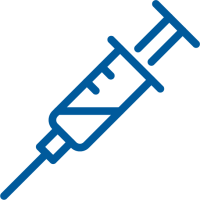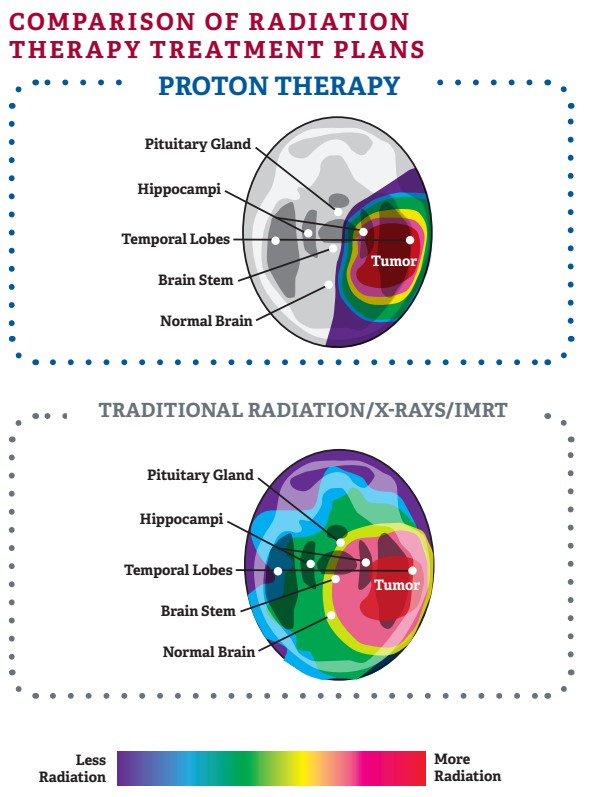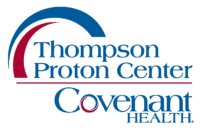Proton therapy for cancer treatment
- Maintains quality of life
- Lower risk of side effects
- Decreased impact on surrounding tissue
- Reduced radiation exposure
- Controlled placement & dosage
- Treatment of complex tumors
- Treatment near sensitive organs
Precise Cancer Treatment
Cancer Treatment that allows patients to maintain their quality of life by reducing risks of side effects.
Proton therapy is an advanced form of radiation therapy that precisely treats the tumor using proton particles instead of x-rays. Protons do not deposit radiation beyond the tumor they are targeting, causing less damage to healthy tissue. Reducing unnecessary radiation results in fewer treatment-related side effects.
94-99%
Cancer-Free
5 YEARS after treatment (for low and intermediate risk prostate cancer patients).
98%
of patients
believe they made the best treatment choice.
96%
of patients
likely to recommend proton therapy to others.
A care coordinator will contact you by phone during normal business hours.
Generic Thompson Cancer Center
Precise Cancer Treatment
Cancer Treatment that allows patients to maintain their quality of life by reducing risks of side effects.
Proton therapy is an advanced form of radiation therapy that precisely treats the tumor using proton particles instead of x-rays. Protons do not deposit radiation beyond the tumor they are targeting, causing less damage to healthy tissue. Reducing unnecessary radiation results in fewer treatment-related side effects.
94-99%
Cancer-Free
5 YEARS after treatment (for low and intermediate risk prostate cancer patients).
98%
of patients
believe they made the best treatment choice.
96%
of patients
likely to recommend proton therapy to others.
A care coordinator will contact you by phone during normal business hours.
Generic Thompson Cancer Center

Particularly effective in treating tumors
With so many delicate organs in the head and neck, it’s critical to deliver precise treatment surrounding a tumor. While radiation therapy can be effective in treating cancer, it also delivers radiation to healthy tissues surrounding a tumor. Proton Therapy is far more precise and can reduce damage to eyes, optic nerves, salivary glands, and other tissue and organs. This precision reduces the likelihood of subsequent side effects such as blindness, hearing deterioration, and dry mouth. Secondary malignancies are also less likely with proton therapy.

Precise treatment with fewer side effects
Proton Therapy is an advanced form of radiation
therapy that precisely targets the tumor utilizing proton particles. Proton particles stop inside the body and do not deposit radiation beyond the tumor they are targeting, causing less damage to healthy tissue. Proton therapy is effective in treating a broad range of tumors including brain, prostate, head and neck, central nervous system, lung, breast, sarcoma, gastrointestinal and many
pediatric cancers.

Maintain quality of life during & after treatment
Because proton therapy reduces treatment-related side effects, most patients are able to maintain their levels of pre-treatment activity throughout treatment.
Stories of Strength
Real Cancer Survivors' Stories
- 31% increase in disease control for aggressive tumors at base of skull (chordomas) at 5 years
- 50% less likely to have secondary brain tumor from treatment
- 55% reduction in average dose to the hippocampi (memory function) in treatment of meningioma
- 27% reduction in overall risk of needing a feeding tube for
oropharyngeal cancer - Fewer side effects first 3 months after treatment, quicker return to normal function in patients with oropharyngeal cancer
- 45% reduction in overall risk of needing a feeding tube for nasopharyngeal cancer
- Dramatic reduction of negative impact on taste, nausea, and painful changes to the mouth in salivary gland treatment
- 44% relative increase in disease free survival rate for nasal and paranasal sinus cavity cancers at 5 years
Proton Therapy delivers significantly less radiation to sensitive organs such as the eyes, spinal cord, brain, and others than X-Rays, greatly reducing the likelihood of side effects.

- 88% less radiation dose to the heart for left sided breast cancer
- 44% reduction in clinically significant radiation doses to the lung
- 90% of partial breast irradiation cases result in good to excellent
cosmetic outcomes at 5 years - Well tolerated – Less than 4% serious side effects (grade 3) in locally advanced breast cancer
- 35% relative increase in overall survival for Stage II & III lung cancer
- 56% relative reduction in incidences of serious (grade 3) pain with
swallowing (esophagitis) - Up to 4-week reduction in treatment time for select cases
- Associated with excellent local control and favorable survival rates
- Able to treat larger tumors (>6cm) ineligible for stereotactic
radiation (SBRT) or ablation
- 10% increase in overall survival at 5 years in stage I-III disease
- 10% increase in local cancer control at 5 years in stage II-III
- 15% decrease in distant metastasis at 5 years in stage II-III
- 26% reduction in pulmonary toxicity compared with X-ray
therapy (IMRT) - 21% reduction in the risk of severe, treatment related
lymphopenia, particularly in lower esophagus - 3-4-day reduction in average hospital stay after surgery
- 5% higher 5-year overall survival in intermediate risk
- Patients who received proton therapy report highest quality of life compared to surgery, x-ray, or brachytherapy patients
- 35% less radiation to the bladder and 59% less radiation to the
rectum - 42% reduction in relative risk of developing a secondary
malignancy - 50% reduction in treatment related bowel frequency and
urgency at 2 years - 21% lower risk of urinary toxicity at 2 years
- 25% lower risk of erectile dysfunction at 2 years
- More than 50% reduction in radiation dose to critical structures including bone marrow
- 31% relative reduction in occurrence of secondary cancers
after treatment
Prostate Cancers
All Risk Categories
Breast Cancer
Early Stage: Whole & Partial Breast
Advanced Stage / LN Positive
Lung and Thoracic Cancers
Lung Carcinoma
Non-Small Cell
• Small Cell (Localized)
• Lymphoma
Thymoma
Head & Neck Cancers
Nasopharyngeal Carcinoma
Paranasal Sinus
Major Salivary Glands
• Parotid
• Submandibular
• Sublingual
Adenoid-Cystic Carcinomas
Oral Cancers
Base of Tongue
Tonsil
Hypopharynx
Gastrointestinal (GI) Cancers
Esophageal
Liver
Pancreatic
Rectal
Anal
Gynecological Cancers
Endometrial / Uterus
Cervix
Lymphoma
B-Cell
Hodgkin
Brain and Skull Base Tumors
Glioma
Meningioma
Astrocytoma
Chordoma/Chondrosarcoma
Acoustic Neuroma
Ependymoma
Hemangioma
Pituitary Adenoma
Benign Lesions
• Arteriovenous Malformations
• Juvenile Angiofibroma
Bladder Cancer
Pediatric Cancers
Sarcomas of Bone or Soft Tissue
Ewing’s Sarcoma
Osteosarcoma
Muscle and Connective Tissue
Chondrogenic Sarcoma
Benign Tumors
Orbital & Eye Tumors
• Lacrimal Gland Tumors
• Orbital Tumors
Tumors Needing Re-Irradiation
Previously treated tumors requiring
additional irradiation
Recurrent or progressive cancers
We have answers to your questions
Yes! There are many American and international clinical studies that prove the effectiveness of Proton Therapy including the three studies mentioned below on this page. We’re happy to provide even more information, please reach out to us and we’ll be happy to share more.
Yes! Of course, each case is different and a treatment plan customized to meet the patient’s needs must be implemented but Proton Therapy can be used in conjunction with conventional radiation, chemotherapy, hormone therapy, and/or as a follow-up to surgery.
Yes! Many private insurance companies in addition to Medicare and state Medicaid programs cover Proton Therapy. We understand you have many questions regarding not only treatment but also cost. Our financial coordinators are here to help you understand your insurance coverage, your own out-of-pocket costs, and even help find alternative financing options if needed.
Given the nature of Proton Therapy, most patients do not feel any pain or discomfort during treatments. Depending on the location of the tumor, some patients might experience minor skin irritation but this can be easily managed.
Not at all! Proton therapy was approved by the U.S. Food and Drug Administration 36 years ago in 1988. To date, there have been more than 105,000 patients treated with Proton Therapy worldwide. This makes Proton Therapy a widely trusted and proven treatment option.

Cancer treatment with protons compared to treatment with conventional radiation/X-rays/IMRT
Protons can be controlled with greater precision than X-rays. This means that more energy goes into destroying the tumor and less radiation is delivered to surrounding healthy tissue.
For this reason, proton therapy is particularly good for treating tumors near healthy organs, including head and neck tumors.

What is proton therapy?
Proton therapy uses charged particles (protons) rather than x-rays to selectively destroy cancer cells. This results in excellent rates of cancer control with a much lower risk of side effects compared with other forms of radiation therapy.
What makes proton therapy different?
Proton therapy is a highly advanced and extremely precise form of radiation. The physical properties of protons, described by the Bragg-Peak (Figure 1 down below), and the increased conformality of pencil beam scanning make it possible to spare healthy surrounding organs from unnecessary radiation exposure during treatment.
Why is this important?
When treating breast cancer with proton therapy, surrounding tissue and vital organs such as the heart and lungs are exposed to far less radiation than standard therapy. Therefore, people treated with proton therapy experience fewer side effects and an improved quality of life during and after treatment.
Is proton therapy effective?
Yes! Many clinical studies have demonstrated the effectiveness of proton therapy for treating many types of cancer.
Less radiation, better quality of life
Proton therapy deposits less radiation dose before reaching the tumor, then deposits the prescribed dose within the tumor, and has no exit dose.
X-ray radiation must start with a higher dose that gradually declines to the prescription dose at the tumor, then continues to deposit radiation in healthy surrounding tissue as it exits the body.

Committed to our cause since 1985
The Thompson Cancer Survival Center Story
World-Class treatment, right in Knoxville, TN
Thompson Proton Center is one of less than 50 proton centers in the entire world. And, we’re proud to be members of Thompson Cancer Survival Center, where leading cancer specialists use the most advanced technologies and treatment methods to achieve breakthrough successes. Our network of cancer care providers are supported by a team of patient navigators, oncology pharmacists, dietitians, genetics counselors, clinical trials experts, physicists, therapists, technologists, and nurses with one goal: to treat and beat your cancer.
Our leading oncologists
You’re in good hands with Thompson Proton Center

Radiation Oncologist
and Medical Director
Ryan Grover, MD
Residency:
Radiation Oncology
Loma Linda University Medical Center
Medical School:
University of Southern California

Radiation Oncologist
Brion Shin, MD
Residency:
Radiation Oncology
Loma Linda University Medical Center
Medical School:
Loma Linda University Medical Center

Radiation Oncologist
Allen Meek, MD
Residency:
Radiation Oncology
Johns Hopkins University
Medical School:
Johns Hopkins University
- Fill in our quick form
- A care coordinator will contact you by phone during normal business hours.
- We’ll take the time to listen and plan the next steps
A care coordinator will contact you by phone during normal business hours.

